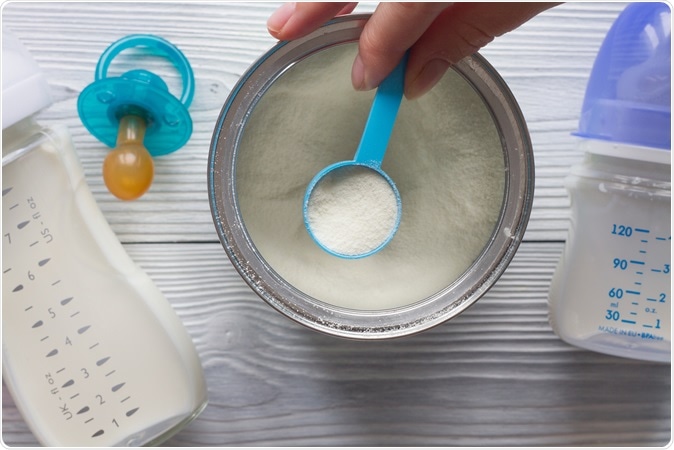A latest study has uncovered a scary fact – nearly 80 percent of infant formulas and baby foods have tested positive for Arsenic content.
The study was initiated by the Clean Label Project which is a not-for-profit organization that works on clearing the labels. They went around testing a wide range of baby food formulas and food items for toddlers. The best selling ones were assessed using Nielson data. The study is not published yet in a medical journal.

Image Credit: 279photo Studio / Shutterstock
The study team looked at 530 baby food products including best selling ones as well as newly emerging ones in the market. The results of the study revealed that 65 percent of the products were positive for arsenic. Regarding arsenic the proportions of arsenic were up to 600 parts of arsenic per billion – which is very high.
Not only that, 36 percent contained lead, 58 percent contained Cadmium (heavy metal that is highly toxic) and 10 percent contained acrylamide. These chemical are seriously damaging to the growing bodies and especially brains of the babies. Among the products that contained most of these harmful chemicals included those from Enfamil, Gerber, Sprout and Plum Organics. Rice based puffs sold in snack pouches were found to contain the highest amounts of these chemicals especially arsenic. Nearly two in three products (around 60 percent) products tested positive for chemical bisphenol A or BPA despite claiming to be “BPA Free” found the study.
Yet another recent report from Environmental Defense Fund had also found that 20 percent of the samples of baby food contained lead. The researchers had tested 2,164 baby food samples from the data gathered by the Food and Drug Administration (FDA) from 2003 to 2013 and found that 86 percent of sweet potatoes samples, 89 percent of grape juice samples and 47 percent of teething biscuits contain detectable lead in them. The present study notes that baby food is more contaminated than regular food. Regular packaged food contains only around 14 percent contamination, the study added.
Lead, arsenic and other toxic chemicals that are being detected in these baby food samples are known to cause damage to the developing bodies and brains of the infants and toddlers say experts. They can damage cognitive abilities as well as development of fine motor skills resulting in delayed development. Most pediatricians recommend not give packaged store-bought foods to babies. The labels, the experts add are usually misguiding as is evident from this study. Home cooked food and fruits and vegetables given directly could be a better option for toddlers and children.
Arsenic
It is a naturally occurring element that is present is high levels in the groundwater of several countries and is highly toxic especially in its inorganic form. The content of arsenic when high in food and drinking water leads to skin problems as well as certain cancers. It can also damage several organs such as the heart, nerves etc.
Conutries that are worst affected by presence of arsenic in their ground water include Argentina, Chile, Mexico, Bangladesh, China, India and the USA. Foods that contain arsenic include rice and other crops requiring irrigation, fish, meat, poultry, dairy products and staple cereals.
Long term exposure to arsenic leads to skin changes including patches and hardening of certain areas of the skin over palms and soles. It may lead to bladder and lung cancers too. Pregnant mothers exposed to arsenic may also have severe consequences including harm to the baby and loss of the baby.